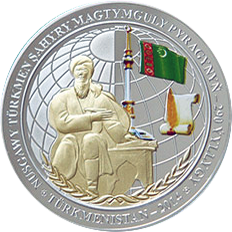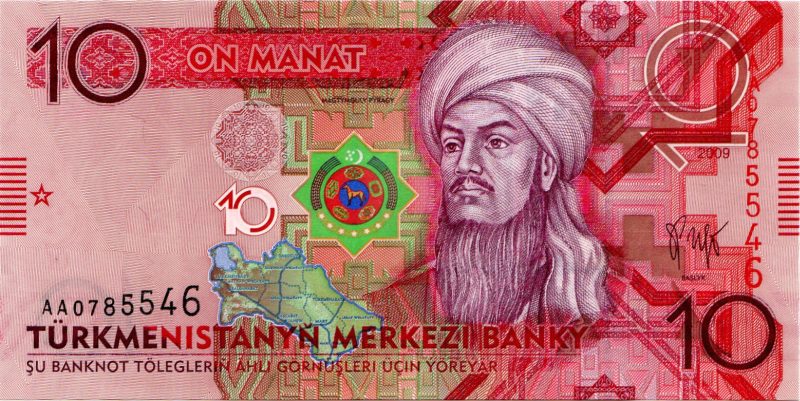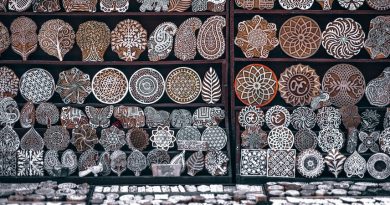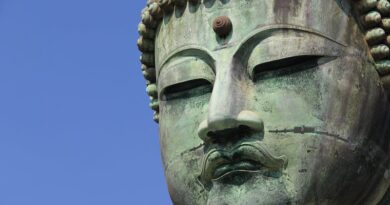Conference: Dr. Bekjayev Takandurdy: The research of Maktynguly Pyragy ´s poetry in Europe
VIENNA – Dr. Bekyajev Takandurdy: The research of Maktynguly Pyragy ´s poetry in Europe. Presentation at the conference on March 13, 2024.
Significant work is being done in our country and abroad in research of the literary heritage of the great Turkmen poet Maktymguly. In this regard, The Resolution of the President of Turkmenistan, dated February 21, 2021, „On celebrating the 300th anniversary of birth of the great thinker and clasic poet of the East – Magtymguly Pyragy and the Decree of the Honorable President Serdar Berdimuhamedov dated December 23, 2022 „Magtymguly the great thinker and clasic poet of the East“ play a vital role. The decision the to aprrove the shedule of events the celebrate the 300th anniversary of Pyragy´s birth has important meaning. These important documents gave a new catalyst to the decelopment of the study of the Magtymguly.
Interest in the poetry of Magtymguly Pyragy has amassed in the middle of the 19 th century. Many famous people of his interesed in him. Alexander Hodzko-Boreiko, who worked as a Russian diplomat at that time, needs to be mentioted. Hodzko-Boreiko (1804-1891) calls Magtymguly Pyragy in his book „Specimens of the Popular Poetry of Persia,“ which was published in London in 1842. The main part of this collection is devoted to andvetures and gahzals Gogorly. Tatar, Kalmyk and Turkmen compositions, were also introduced in that collection.
A.Khodzko did not translate all verses of Maktyngbuly ´s poems. He translate some lines by adding them to each other. For example, he named th poet´s poem „The Beatifu Guests“ as „Mehdum-Kuly to His Mother.“ The main method he used was word-for-word and explicatory translation. The greatness of Maktynguly Pyragy is indisputable and and it is obvious when we read his works in the original as well as in translations.
I.N. Berezin and A. Vamberi gave readers brief information about the opet after A. Hodzko.
One of discoverers of the 19th century of the poet Magtymguly was the Hungarian scienctist Armeri Vamberi. He was in Central Asia in 1863. At that time, he took a copy of manuscrypts of Magtymguly. That manuscript of the poet consists of 260 pages. Two yars later, in 1865, Vamberi mentioned about Maktyngbuly´s life and poetry in his book named „Travels to Central Asia.“
In 1879, A. Vamberi published the wor „The Language of the Turkmes and Divan of Magtynguly.“ In this work, he gives general information about the life and work of the poet. This scientist published 31 poems of the poet in full versions, and the parts o 10 poems in the orginal version and in translation into German. A. Vamberi noted that the temes about horses and weapons, and heroism play and important role in the poet´s work, and his is consired a national poet among Turkmens. „It cannot be denied that Magtymguly had a goo and noble influence on all Turkmens, regardless of tribe and tribe, through his works.“
The systematic study of Magtymguly biography and poetry literally began in the 20th century. Academian A. N. Samoylovich, a Russian scientist, contributed greatly to the study of Magtymguly´s. poetry deserves spetial mention. He compiled the indexes of Magtymguly´s poems, simulauteneosly expressed tha first scietific views about the poet.
The poems of the great Turkmen classical poet and philosopher Magtymguly Pyragy have been translated into dozens of languages.
Helga Doresia Kors Kegel and Aljandro Munios Kors, whoe tranlated Magtymguly´s poems into Spanish, occupy a special role. They have done a priceless job. Our State highly appreciates the translator ´s contributions to the develompemnt of humaritian relations. In 2014, they were awarded the „Magtymguly Pyragy“ medal on the ocassion of the poet´s 290th anniversary for tranlating Magtymguly´s poems into Spanish.
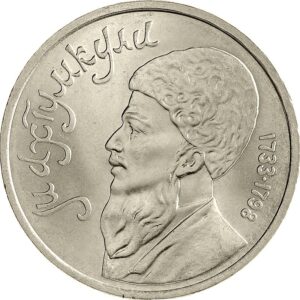
Helga Kors says about the tranlation of Magtymguly´s poems: “First of all, the translator shoul know the history of the autor´s time, his mentors and their poetry, the poet´s spiritual state, ect.“ Before I started translating Magtymbguly Pyragy´s poems, I studiet his biography very well, including the lives and works of great wordsmiths of the East whom Magtymguly cosiders his mentors. After that, I got acquainted with the translations of Magtymguly´s poems published in German in the 19th century by A. Vamberi Then I paid attention to literal translations in Russian and English languages. I found out that all the traslators were able to convey the depth of Magtymguly´s poetic poetry to the reader.“
Magytymguly´s poems are being translated into French now. In 1975, some of the poet´s poem were translate into French by Louis Bazen and Pertec Boratav. Moreover, I would like the mention to mention Margita Aslan,a teacher at Babes-Bolia University of Cluj, Romania, who is curently translateing the Magtymbuly ´s poem´s into Roamania.
Magtymguly´s Pyragy´s manuscript are very important for studying the past history, life, culture, language and literature o the Turkmen people. Magtymguly Pyragy managed to convey the proglems experienced by the Turkmen who buil great empires in the 18th-19th centuris through his poems. The main of reason why the poet´s poems are loved and read by the people and have reached our days, is that every human beeing sees his daily life in his poems. The events in Magtymguly´s poems describe not only Turmen life, but also the life of all peoples living in that region.
In order to study our poets and their literary heritage objectively, corectly and cleary, we must first of all refer to the manuscripts written by them or written at their time. Indeed, manuscripts are of great importatnce as primary sources for studying the past history, literature, science and culture of nations. Manuscripts are the key to scientific exploratio of our heritage.
The number of Magtymguly Divans of Pyragy thet have reached our days is close to 80 and they are stored in the of the Institute of Language, Literature and National Manuscripts named after Magtymguly of the Academy of Science of Turkmanistan. Moreover, Magtymguly works can be found in about 50 beyaz (anthologies). We can also say that his poems are found in about 200 manuscripts of other poets. In the manuscript consist entirely or more than 90 percent of Magtymguly poems, in can be consire Divan of Magtymguly.
Manuscript heritage of Magtymguly is stored in the Manuscript fund of the Academy of Sciences in Budapest, Hungary; The British Museum in England, and the Library of the Federal Republic of Germany in Dsesden.
We sincerly believe that today´s international cosultation dedicated to the 300th annivarsary of the great Turkmen thinker and poet Magtymguly Pyragy will significantly contribute to the future development of science and culture, the brotherhood and freindship of world peoples, and strengthening of relations between Turkmenistan and Austria.
Gurbanguly BERDIMUHAMEDOW
TREASURY OF WISDOM – MARTYMGULY PYRAGY
Faithful servant of all poetic worlds –
Treasury of wisdom – Magtymguly Pyragy.
The eternal basis of all unshakable strongholds –
Treasury of wisdom – Magtymguly Pyragy.
To serve of humanity means freedom for him,
He is living language for all Turkmens.
Reverence for sacred eternal will of Heavens –
Treasury for wisdom – Magytmguly Pyragy.
Worshipping dear for all Turkmens man,
We bow down before this saint man.
He shares his fame with us, makig us happy,
Treasury of wisdom – Mygtymguly Pargy,
His great bright legends are milliannia-old,
The Almighty sent him to hels those in need,
He is a true citizen of all times and peoples of the world –
Treasury of wisdom – Magtymguly Pyragy.
We pay out tribute to his soul´s pure spirit,
We bow down before his bright ideas and wisdom.
All full-lenght monument to His Majesty Magtymguly Pyragy,
Has been erected at the Kopetda Mountains Foothills.
Theree centuries passed since he entered his poetic world,
His still faithfully serves all peoples of the world,
He always remains the same immortal Pyragy,
Treasury of wisdom – Magtymguly Pyragy.
His Majesty Magtymguly Pyragy.
